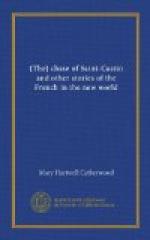THE CHASE OF SAINT-CASTIN.
The waiting April woods, sensitive in every leafless twig to spring, stood in silence and dim nightfall around a lodge. Wherever a human dwelling is set in the wilderness, it becomes, by the very humility of its proportions, a prominent and aggressive point. But this lodge of bark and poles was the color of the woods, and nearly escaped intruding as man’s work. A glow lighted the top, revealing the faint azure of smoke which rose straight upward in the cool, clear air.
Such a habitation usually resounded at nightfall with Indian noises, especially if the day’s hunting had been good. The mossy rocks lying around, were not more silent than the inmates of this lodge. You could hear the Penobscot River foaming along its uneasy bed half a mile eastward. The poles showed freshly cut disks of yellow at the top; and though the bark coverings were such movables as any Indian household carried, they were newly fastened to their present support. This was plainly the night encampment of a traveling party, and two French hunters and their attendant Abenaquis recognized that, as it barred their trail to the river. An odor of roasted meat was wafted out like an invitation to them.
“Excellent, Saint-Castin,” pronounced the older Frenchman. “Here is another of your wilderness surprises. No wonder you prefer an enchanted land to the rough mountains around Bearn. I shall never go back to France myself.”
“Stop, La Hontan!” The young man restrained his guest from plunging into the wigwam with a headlong gesture recently learned and practiced with delight. “I never saw this lodge before.”
“Did you not have it set up here for the night?”
“No; it is not mine. Our Abenaquis are going to build one for us nearer the river.”
“I stay here,” observed La Hontan. “Supper is ready, and adventures are in the air.”
“But this is not a hunter’s lodge. You see that our very dogs understand they have no business here. Come on.”
“Come on, without seeing who is hid herein? No. I begin to think it is something thou wouldst conceal from me. I go in; and if it be a bear trap, I cheerfully perish.”
The young Frenchman stood resting the end of his gun on sodden leaves. He felt vexed at La Hontan. But that inquisitive nobleman stooped to lift the tent flap, and the young man turned toward his waiting Indians and talked a moment in Abenaqui, when they went on in the direction of the river, carrying game and camp luggage. They thought, as he did, that this might be a lodge with which no man ought to meddle. The daughter of Madockawando, the chief, was known to be coming from her winter retreat. Every Abenaqui in the tribe stood in awe of the maid. She did not rule them as a wise woman, but lived apart from them as a superior spirit.




